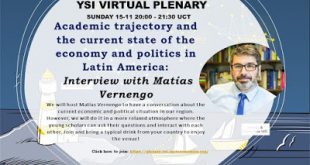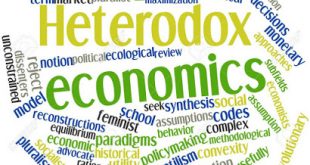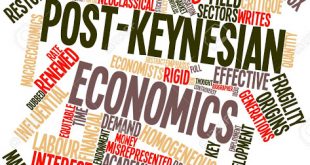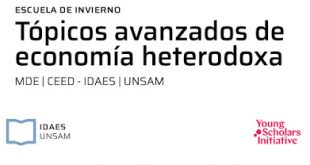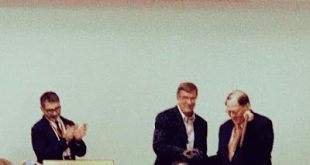The English translation of Sergio Cesaratto's book has been published. A Free chapter is available at the Springer website here.From the promotion pamphlet:This book discloses the economic foundations of European fiscal and monetary policies by introducing readers to an array of alternative approaches in economics. It presents various heterodox theories put forward by classical economists, Marx, Sraffa and Keynes, as a coherent challenge to neo-classical theory. The book underscores and...
Read More »The Portrait of the Heterodox Economist as Young Man
Tomorrow at 3pm (EST) a frank and informal talk about heterodox economics, my personal trajectory in the profession and discussions about political economy in Latin America with some young scholars from the YSI initiative. Join here.
Read More »Reflections after a Post Keynesian Workshop
Jessica Finnamore (Guest blogger)Heterodox economics refers to any school of thought which is not accepted by the economic mainstream, or neoclassical economics. Post-Keynesian economics is a heterodox school of thought which believes (amongst other things) in high levels of government intervention, fundamental uncertainty, and that the economy is demand-driven rather than supply-constrained (as neoclassical economics says). Keynes himself was concerned with creating theories which were...
Read More »Reflections after the Post Keynesian Economics Workshop
By Santiago Graña Colella (Guest blogger)During my bachelor’s degree, I have little access to heterodox literature. What is worst, in most subjects, it was explained that the economy works in a particular fashion everywhere and every time, but without stating that this way was one interpretation of the economy, particularly the neoclassical interpretation. Consequently, most students do not know many alternatives to the economic theory thought to them and after five years (in Latin America)...
Read More »Mainstream Economics/Sold Out?
I recently taught a short workshop (online) on Post Keynesian Economics (PKE) for Summer Academy for Pluralist Economics. I basically discussed the definitions of heterodox and Post Keynesian economics, and some critical issues in the theory of output, employment, money and inflation, and income distribution and growth. Students were from several countries, backgrounds, disciplinary fields and stages in their academic careers (from undergraduates to PhD candidates). I will post some brief...
Read More »Summer (Winter down in Argentina) School on Advanced Topics in Heterodox Economics
The whole program here. In Spanish. The opening table with Martín Abeles and I, Monday, July 27th at 10am (Buenos Aires time; 9am, EST). Instructors include: Pablo Bortz, Ariel Dvoskin, Germanics Feldman, Manuel Gonzalo, Roberto Lampa, Pablo Lavarello, Andrés Lazzarini, Marga Olivera, Veronica Robert, Sebastián Valdecantos, and Nicolás Zeolla. It's a great opportunity!
Read More »Why Keynes was a socialist
In an important new book Keynes Against Capitalism: His Economic Case for Liberal Socialism (Routledge, 2019) James Crotty argues that Keynes was a socialist who advocated a much more radical economic agenda than most mainstream economists and political analysts realize. Based on a very close reading of Keynes’ work, Crotty argues that core Keynesian economic ideas should inform democratic socialism today. The conventional wisdom assimilated into mainstream perspectives is that...
Read More »Why Keynes was a socialist
In an important new book Keynes Against Capitalism: His Economic Case for Liberal Socialism (Routledge, 2019) James Crotty argues that Keynes was a socialist who advocated a much more radical economic agenda than most mainstream economists and political analysts realize. Based on a very close reading of Keynes’ work, Crotty argues that core Keynesian economic ideas should inform democratic socialism today. The conventional wisdom assimilated into mainstream perspectives is that...
Read More »Three Economic Ideas Threatening to Defenders of the Status Quo — Peter Cooper
1. Profit as surplus labor or as a property-based claim One idea threatening to the defenders of the status quo is the recognition that profit income reflects capitalist property relations rather than productive contribution.… 2. Capitalist economies are demand constrained The Keynesian or Kaleckian principle of effective demand may not seem quite such a hindrance to defenders of the status quo as knowledge of the nature of profit, but the motivation for its denial – at least in the...
Read More »James K. Galbraith’s Veblen-Commons award
Ritual and prestige among the Institutionalists Jamie got the Veblen-Commons award, something his father received back in 1976. I introduced him, and as expected discussed a bit his contributions to economics, and the understanding of institutions. His most important contributions are on the field of inequality, and the work he has done with the University of Texas Inequality Project (UTIP).There are many contributions that Jamie and UTIP have made. His use of the UNIDO payroll data,...
Read More » Heterodox
Heterodox


